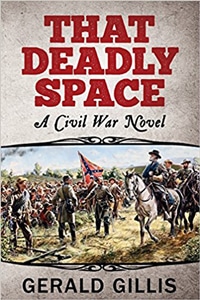A unique and compelling character, John Brown Gordon was one of Georgia’s most consequential political and military leaders of the nineteenth century. He studied at the University of Georgia, though he dropped out shortly before graduation to read law. He possessed no formal military training, yet he rapidly ascended through the officer ranks of the Confederate army to where, by the end of the war, he commanded a corps in Robert E. Lee’s Army of Northern Virginia.
Apart from the protagonist in my Civil War historical novel That Deadly Space, John B. Gordon’s role is one of unequalled importance. His fictionalized involvement in the novel is that of a mentor to, and the commander of, the central character Conor Rafferty. Conor serves with John Gordon in the battles at Antietam, Gettysburg, The Wilderness, Petersburg, and at the close of the war near Appomattox Court House.
What made John Gordon so unique? For starters, he was a gifted military commander with astonishing bravery.
At Antietam, the audacious Gordon led his regiment in the desperate struggle at an old eroded farming road that would thereafter be referred to as Bloody Lane. He was shot twice in the same leg, once in the arm, then the shoulder, and finally in the face. He was eventually nursed back to health due in large measure to the efforts of his wife, who travelled with him throughout the war.
During the Confederate invasion of Pennsylvania, Gordon’s brigade occupied Wrightsville, on the Susquehanna River. When Union militia burned the long covered bridge spanning the river to thwart Gordon’s crossing, embers from the fire quickly spread to Wrightsville. Gordon formed his Confederate troops into a bucket brigade and managed to prevent the fire from destroying much of the town.
At the war’s end, as the defeated Confederate soldiers were turning in their muskets and other associated military equipment, Union General Joshua Chamberlain, who earned the Medal of Honor at Gettysburg, called for his men to salute their conquered foe. Seeing Chamberlain’s salute, Gordon sat upon his horse, drew his sabre, and returned Chamberlain’s salute. It was an impressive display of mutual respect that would never be forgotten by either general, nor by those who close enough to witness it.
After the war, John B. Gordon served as a United States Senator and later as Governor of Georgia. Gordon opposed Reconstruction, and was thought to be the titular head of the Ku Klux Klan though his role there was never conclusively determined. However, as a politician he shaped a vision of national unification, an economic vitality of a South free of slavery, and care for veterans. He died in 1904 at the age of 71 and was buried in Atlanta’s Oakland Cemetery. A crowd estimated at 75,000 attended the service.
A man of many talents, John B. Gordon was indeed a unique and consequential figure of his time.



